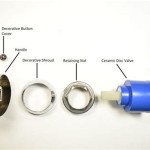Smelly Bathroom Sink Faucet: Essential Aspects to Address
A smelly bathroom sink faucet can be a nuisance and an indication of underlying plumbing issues. Understanding the causes and remedies for a foul odor emanating from your faucet is crucial for maintaining a clean and healthy bathroom environment.
Causes of Smelly Faucet
1. Bacterial Buildup: Over time, bacteria and microorganisms accumulate inside faucet aerators, pipes, and gaskets. This buildup can lead to a musty or sour smell. 2. Hard Water Deposits: The accumulation of mineral deposits, known as scale, can restrict water flow and create an ideal environment for bacteria to thrive. 3. Corrosion: Metallic faucets can corrode due to exposure to moisture and minerals in water. This corrosion can release foul-smelling gases. 4. Drain Issues: Blockages or slow drainage in the sink can cause water to stagnate, leading to the formation of unpleasant odors.Remedies for Smelly Faucet
1. Cleaning the Aerator: Regularly remove and clean the faucet aerator by soaking it in a vinegar or bleach solution to eliminate bacterial buildup. 2. Flushing the Faucet: Run hot water through the faucet for several minutes to flush out any debris or bacteria. This can help prevent future buildup. 3. Descaling: Use a commercial descaling solution or vinegar to remove hard water deposits. Pour the solution into the aerator or soak the faucet head in it. 4. Checking for Leaks: Inspect the faucet for leaks, as even a small drip can create moisture buildup and foster bacteria growth. If leaks are detected, tighten the connections or replace the faulty parts. 5. Cleaning the Drain: Remove any blockages or debris from the sink drain using a drain cleaner or baking soda and vinegar solution. This will ensure proper drainage and prevent water stagnation. 6. Professional Inspection: If the above remedies fail to resolve the issue, it is advisable to contact a licensed plumber to investigate the underlying cause and recommend appropriate solutions.Preventive Measures
1. Regular Cleaning: Clean the faucet and aerator regularly to prevent bacteria buildup. 2. Using Water Filters: Installing water filters can help reduce the accumulation of mineral deposits and other contaminants. 3. Maintaining Proper Ventilation: Ensure that the bathroom is properly ventilated to minimize moisture buildup and prevent corrosion. 4. Avoiding Harsh Chemicals: Do not use abrasive or harsh chemicals to clean the faucet, as they can damage the surface and promote corrosion.Conclusion
Maintaining a clean and odor-free bathroom sink faucet requires regular cleaning, proper maintenance, and prompt attention to any issues. By following these essential aspects, you can eliminate unpleasant odors and ensure a fresh and hygienic bathroom environment.
Moldy Smelling Water From Bathroom Faucet Hometalk

How To Treat Smelly Water Finkens

Sewer Smell In Bathroom Solved Bob Vila

Why Water Smells Like Sulfur In One Faucet

How To Clean A Stinky Sink Drain Home Repair Tutor
My Bathroom Smells Bad But Only When Its Hot Outside It Also Will Slightly Go Away I Run The Sink And Toilet Bathtub Any Thoughts On What Is

Why Does My Bathroom Sink Smell Like Sewer Top Causes

How To Get Rid Of Sink Smell Benjamin Franklin Plumbing

Why Does My Faucet Water Smell Five Star Plumbing

Why Does My Water Smell 6 Common Smells Their Causes
Related Posts







